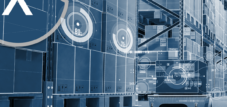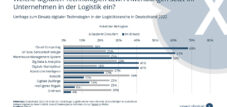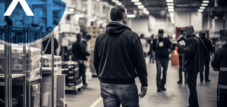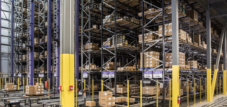Optimized future: Digital technologies in logistics – artificial intelligence, sensor technology, robotics and intelligent shelving systems
Language selection 📢
Published on: July 26, 2024 / update from: July 26, 2024 - Author: Konrad Wolfenstein

Future and what's to come: Digital technologies such as AI in logistics with sensor technology, robotics and intelligent shelves - Image: Xpert.Digital
🌐🚛 Survey: Which digital technologies or applications does your company use in logistics?
🚀 Digital technologies in logistics: An overview and outlook
Digitalization is revolutionizing the logistics industry in many ways. Companies are increasingly relying on modern technologies to optimize their processes, reduce costs and increase customer satisfaction. This text highlights some of the most important digital technologies and their applications in logistics, with a particular focus on artificial intelligence (AI), sensor technology, robotics and smart shelves. These technologies not only offer potential for increasing efficiency, but also for innovation throughout the entire supply chain.
☁️ Cloud computing
Cloud computing plays a central role in modern logistics. It allows companies to store their data centrally and access it from anywhere. This facilitates collaboration between different departments and locations and offers flexible scalability of IT resources. According to a survey, 68% of logistics companies surveyed are already actively using cloud computing, while 16% are planning or discussing it.
🌐 IoT and sensor technology
The Internet of Things (IoT) and sensor technologies are key factors for monitoring and controlling logistics processes. IoT devices can be installed in transportation, warehouses and even the goods themselves to collect real-time data about location, temperature, humidity and other relevant factors. This data helps companies increase efficiency, minimize losses and proactively respond to potential problems. Currently, 61% of companies use these technologies, and another 23% plan to use them.
🏢 Warehouse Management Systems (WMS)
Warehouse management systems are specialized software solutions that automate and optimize all aspects of warehouse management. These systems provide inventory control, order fulfillment, and storage space optimization capabilities. They help streamline workflows and reduce storage costs. With 59% of companies using WMS and 25% considering it, there is widespread acceptance of this technology in the industry.
📊 Big Data and Analytics
The analysis of large amounts of data (big data) is particularly valuable in logistics in order to identify patterns and trends that can be used to optimize processes. By evaluating historical data, companies can better predict when and where resources will be needed. This not only improves efficiency, but also enables a personalized customer approach. 41% of companies are already using Big Data & Analytics, while 29% are considering these technologies.
🤖 Artificial Intelligence (AI)
Artificial intelligence (AI) has diverse applications in logistics, from route optimization to predicting delivery times to automating customer service interactions. AI algorithms can analyze large amounts of data and identify patterns that human analysts may miss. However, the use of AI in logistics is not yet as widespread as other technologies, with 22% of companies actively using AI and 27% considering it.
🤖 Robotics
Robotics is playing an increasingly important role in the automation of warehouse and distribution processes. Robots can be used for picking, packing and transporting goods, significantly increasing efficiency and reducing labor costs. Currently, 11% of companies use robots, and 36% are planning or discussing their use.
🖥️ Digital twins
Digital twins are virtual models of physical objects or systems that use real-time data to simulate their behavior. In logistics, digital twins can be used to model warehouses and test different scenarios without making physical changes. This can help identify bottlenecks and improve efficiency. 14% of companies already use digital twins, while 25% are considering using them.
📦 Smart shelves
Smart shelves are sensor-equipped shelving systems that automatically monitor and update inventory. This technology makes it possible to track inventory levels in real time and avoid stock-outs or overstocks. Although this technology offers great potential, only 6% of companies are currently using it, while 25% are thinking about implementing it.
🚁 Drones
Drones offer innovative solutions for last-mile delivery, especially in hard-to-reach or remote areas. They can also be used for inventory in large warehouses or for monitoring transport routes. However, the use of drones in logistics is still in its early stages, with only 4% of companies using this technology and 26% discussing its use.
🚀 Outlook and future prospects
The logistics industry is facing an exciting future in which the integration and further development of digital technologies will play a key role. The increased use of AI, IoT and big data will enable companies to make their supply chains even more efficient and flexible. The challenge will be to implement these technologies safely and responsibly, particularly when it comes to data protection and cybersecurity.
Digital technologies will profoundly change the logistics industry and offer a variety of opportunities for innovation. Companies that invest in these technologies can secure competitive advantages and better respond to the changing demands of the market. In the coming years, the role of these technologies will continue to increase, which promises to be an exciting development for the industry.
📣 Similar topics
- 📦 Revolutionizing logistics through digital technologies
- ☁️ Cloud computing in modern logistics
- 🔗 IoT and sensor technology: The networking of logistics
- 🏢 Warehouse management systems: efficiency in the warehouse
- 📊 Big Data and Analytics: Optimize logistics processes
- 🧠 Artificial intelligence in logistics: A look into the future
- 🤖 Robotics: Automation in the logistics industry
- 🌀 Digital twins: Virtual models for real optimization
- 🛒 Smart Shelves: Automate inventory management
- 🚁 Drones: Innovation in the last mile
#️⃣ Hashtags: #Digital Technologies #Logistics #ArtificialIntelligence #IoT #Robotics
🎯🎯🎯 Benefit from Xpert.Digital's extensive, fivefold expertise in a comprehensive service package | R&D, XR, PR & SEM

AI & XR 3D Rendering Machine: Fivefold expertise from Xpert.Digital in a comprehensive service package, R&D XR, PR & SEM - Image: Xpert.Digital
Xpert.Digital has in-depth knowledge of various industries. This allows us to develop tailor-made strategies that are tailored precisely to the requirements and challenges of your specific market segment. By continually analyzing market trends and following industry developments, we can act with foresight and offer innovative solutions. Through the combination of experience and knowledge, we generate added value and give our customers a decisive competitive advantage.
More about it here:
🌐📦 Advancing digitalization and its impact on the logistics industry
📦🤖 Advancing digitalization has found its way into almost all areas of our society and is also revolutionizing the logistics industry. In a world where efficiency and accuracy are top priorities, digital technologies pave the way for optimized and future-oriented logistics. Artificial intelligence (AI), sensor technology, robotics and intelligent shelving systems play key roles.
🧠 Artificial Intelligence – Giving logistics an intellectual upgrade
Artificial intelligence has the potential to fundamentally transform the logistics industry. The ability to analyze large amounts of data in real time and gain valuable insights from it allows companies to make their logistics processes more precise and efficient. AI applications make it possible, for example, to create demand forecasts, optimize inventories and dynamically adjust supply chains.
One of the most notable use cases of AI in logistics is route optimization. Traditionally, route planning is based on rigid algorithms and empirical values that often do not sufficiently take unforeseen events such as traffic jams or weather conditions into account. AI, on the other hand, can use machine learning to analyze data in real time and calculate the most efficient route. This not only reduces delivery times, but also transport costs and CO2 emissions.
👂👁️ Sensor technology – the eyes and ears of modern logistics
Sensor technology plays a central role in monitoring and controlling logistical processes. Sensors can monitor various environmental factors such as temperature, humidity and vibration in real time, ensuring that sensitive goods such as food or pharmaceutical products are transported in optimal conditions.
An example of the use of sensor technology in logistics is the so-called “Internet of Things” (IoT). By networking freight sensors, storage racks and means of transport, intelligent systems are created that can act and communicate independently. Inventory levels can be managed automatically and repeat orders can be initiated in a timely manner in the event of delivery bottlenecks. This connectivity contributes significantly to reducing downtime and improving supply chain efficiency.
🤖🎛️ Robotics – automation and increasing efficiency in logistics
Robotics and automation are key drivers of modern logistics. Autonomous robots are already in use in many warehouses and distribution centers today, taking on tasks such as picking, packing and transporting goods. These robots not only work faster and more precisely than human workers, but also relieve them of physically demanding tasks.
An outstanding example of the use of robots are the autonomous vehicles that operate between warehouses and production facilities. These vehicles navigate autonomously using AI and sensors and can detect and avoid obstacles. This optimizes the internal flow of goods and shortens throughput times.
📦🧩 Intelligent shelving systems – the backbone of the modern warehouse
Intelligent shelving systems are an integral part of automated warehousing. Such systems consist of modular, flexibly adaptable shelving systems that are controlled by software and provide real-time data on inventory levels and goods movements. By integrating AI and sensor technology, these systems can optimize warehouse operations, for example by automatically assigning storage locations depending on the type and frequency of goods.
A particularly innovative example is the concept of the “goods-to-person” system. Required items are automatically transported to the warehouse workers instead of them having to travel long distances in the warehouse. This drastically reduces travel times and increases productivity throughout the entire warehouse process.
🚀🔮 Further developments and future prospects
In addition to the technologies mentioned, there are numerous other innovations that will have a lasting impact on the logistics industry. One promising area is blockchain technology, which can ensure transparent and forgery-proof documentation in supply chains. The decentralized and unchangeable storage of transaction data significantly improves the traceability of goods, which is particularly important in the food and pharmaceutical industries.
The development of drones and autonomous delivery robots is also progressing. In the near future, these can take on a central role in urban delivery traffic by bringing parcels directly to customers in an efficient and environmentally friendly manner. The use of drones could not only shorten delivery times, but also reduce traffic congestion in urban areas.
Ultimately, sustainability is also playing an increasingly important role in logistics. Companies are increasingly striving to reduce their carbon footprint and use environmentally friendly technologies. Electric vehicles, energy-efficient warehouses and the increased use of recycled materials are just a few examples of initiatives that contribute to the ecological optimization of logistics processes.
💡🔧 Integration of digital technologies in logistics
The integration of digital technologies in logistics is inevitable and gives the industry enormous potential to increase efficiency and performance. Artificial intelligence, sensor technology, robotics and intelligent shelving systems are at the center of this transformation. They enable more precise planning, faster throughput times and overall greater efficiency. At the same time, they offer companies the opportunity to react more flexibly to market changes and to make their supply chains more resilient. As these technologies continue to advance, the vision of fully connected and automated logistics remains a fascinating and achievable future.
📣 Similar topics
- 🚀 The revolution in logistics through digitalization
- 🤖 Artificial Intelligence in Logistics – An Intellectual Upgrade
- 🔍 Sensor technology: The eyes and ears of modern logistics
- 📦 Increasing efficiency through robotics and automation in logistics
- 🏗️ Intelligent shelving systems – The backbone of the modern warehouse
- 🌐 The Internet of Things and its importance for logistics
- 📡 Future prospects: Drones and autonomous delivery robots
- 💼 Blockchain technology: transparency and security in supply chains
- ♻️ Sustainability in logistics: Green technologies in use
- 🔄 Integration of digital technologies and their impact on logistics
#️⃣ Hashtags: #Digitalization #Logistics #ArtificialIntelligence #Robotics #Sustainability
We are there for you - advice - planning - implementation - project management
☑️ Industry expert, here with his own Xpert.Digital industry hub with over 2,500 specialist articles
I would be happy to serve as your personal advisor.
You can contact me by filling out the contact form below or simply call me on +49 89 89 674 804 (Munich) .
I'm looking forward to our joint project.
Xpert.Digital - Konrad Wolfenstein
Xpert.Digital is a hub for industry with a focus on digitalization, mechanical engineering, logistics/intralogistics and photovoltaics.
With our 360° business development solution, we support well-known companies from new business to after sales.
Market intelligence, smarketing, marketing automation, content development, PR, mail campaigns, personalized social media and lead nurturing are part of our digital tools.
You can find out more at: www.xpert.digital - www.xpert.solar - www.xpert.plus

























